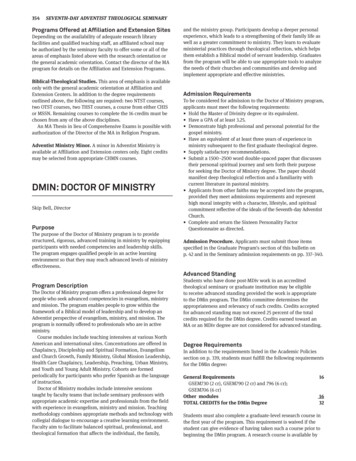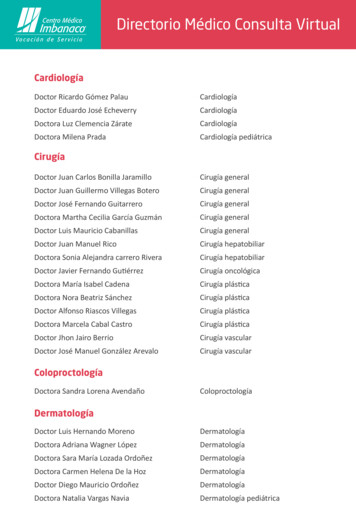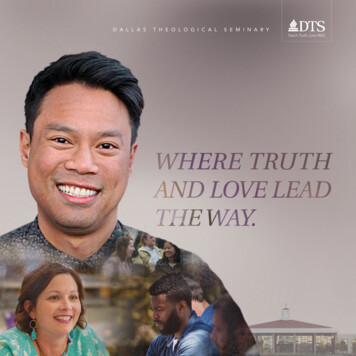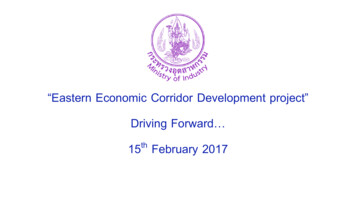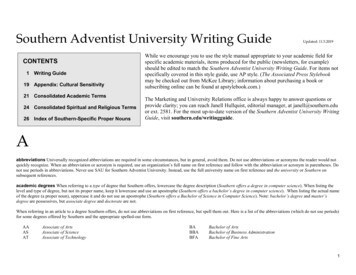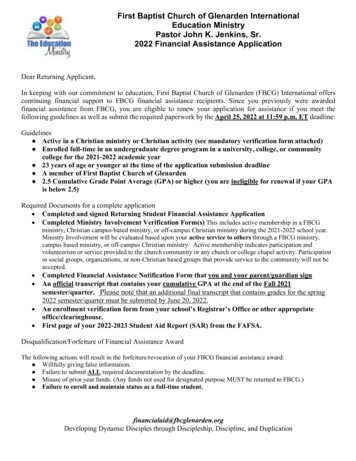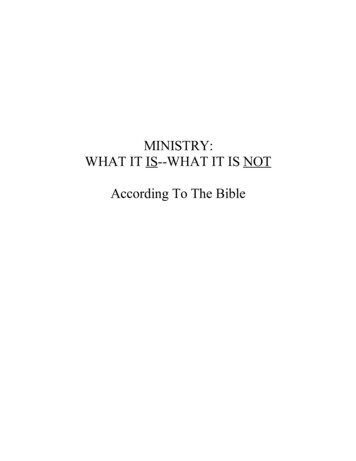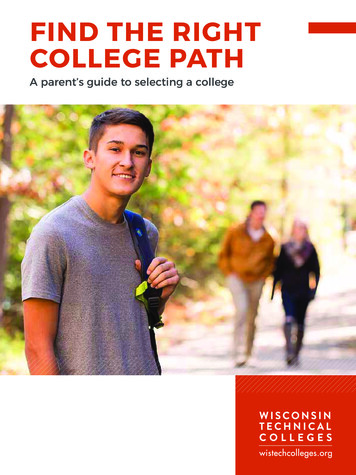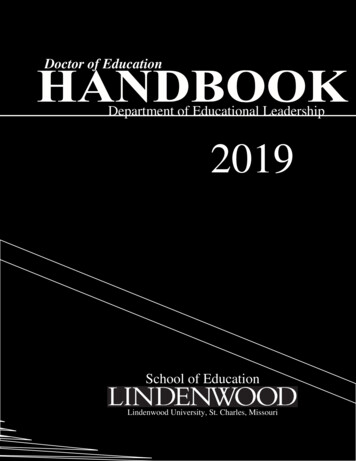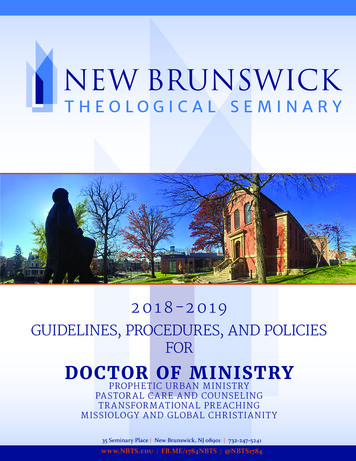
Transcription
2 0 1 8 -2 0 1 9GUIDELINES, PROCEDURES, AND POLICIESFORDOCTOR OF M INISTRYPROPHET IC U R BA N M INIST RYPA STOR A L C A R E A ND COUNSELINGT R A NSFOR M AT IONA L PR E ACHINGM ISSIOLOGY A ND GLOBA L CHR IST I A NIT Y35 Seminary Place New Brunswick, NJ 08901 732-247-5241www.NBTS.edu FB.ME/1784NBTS @NBTS1784
Table of ContentsTable of Handbooks 5A Brief History 6Our Vision and Mission 7Introduction 8Admission Requirements 9Admission Criteria 9Provisional Admission 9Deadline for application 10Withdrawal from application process 10Reapplying to NBTS 10Program Objectives, Pedagogy, and Structure 11Program Objectives 11Pedagogical Commitments 11Structure Of The Program 11Doctor Of Ministy Concentrations 12Metro-Urban Ministry 12Transformational Preaching 12Pastoral Care And Counseling 12Doctor of Ministry in Prophetic Urban Ministry 13Prophetic Urban Ministry – Curriculum Framework 14Doctor of Ministry in Transformational Preaching 15Transformational Preaching – Curriculum Framework 16Doctor of Ministry in Pastoral Care and Counseling / Pastoral Theology 17Pastoral Care & Counseling – Curriculum Framework 18Doctor of Ministry Schedule Planner 19All Cohorts: Your Coursework Progress Assessments 20Coursework Progress Assessments 21Definitions And Requirements For Coursework Progress Assessments 22The Covenant Group 23Selection, Roles And Responsibilities Of The Covenant Partners 23
The Learning Community of the NBTS Doctor Of Ministry Project 25Covenant Agreement Form 26Evaluation Of Candidate Form 27The Preliminary Project Idea 28The Ministry Project Dissertation and Doctor Of Ministry Proposal 29The Purpose of the Ministry Project Dissertation 29The Ministry Project 30Human Subjects In Research 31Consent Form To Participate In Research Study (Page 1 Of 2) 32Consent Form To Participate In Research Study (Page 2 Of 2) 33The Project Proposal 34Formatting The Proposal: 38The Degree Portfolio 38The Ministry Project Summation / Candidacy Review 38A Prerequisite of the Project 40Ministry Project Evaluation Key (for Advisors & Readers) 40The Final Dissertation 40Final Editing 42The Oral Defense 42Helpful Exercises 43I. Identifying and Thinking about a Challenge in Ministry: Posing the Questions 43II. Designing Research: Exploring the Questions 45III. Doing the Research: Engaging Three Areas of Inquiry 45Some Ideas For Your Inquiry 47Guidelines For Filing The Dissertation 47Securing a Copyright and Publishing 47Proposal And Dissertation Timeline 483-Year Work Flow Chart 50Registration For Classes 51Grading System And Faculty Evaluations 51
Withdrawal Policy Dismissal From The Program Readmission / Reinstatement Plagiarism Graduation Obligations (Year Three) 5252525454Tuition, Fees, And Financial Aid 55Continuation Fee (Year Three) 55Financial Aid Information 55William D. Ford Federal Direct Loan Program 56Annual Loan Limits And Direct Loan Eligibility For Graduate Students 56Standard Documents Required From All Financial Aid Applicants 57Application Deadlines 57Approved Leave Of Absence For Sudent Recipients Of Federal Title IV Aid 58Return Of Title IV Funds 58Direct Loan Entrance Interview Policy And Master Promissory Note 58Direct Loan Exit Interview Policy 58Tax Information 58Disability Support Services 59Academic Advisement and Oversight 59Qualifications Of Advisors 60Appointment Of Advisors 60Change Of Advisors 60Dissertation Readers 61Appendix 62
Table of HandbooksThis program is governed by these handbooks: The Academic Catalog contains the course descriptions for all degree programs. The General Polices Handbook applies to students in all degree programs. The Master’s Handbook and the Doctor of Ministry Handbooks contain policies specific to eachprogramIt is the responsibility of the student to read and follow the policies in this handbook. It will beassumed by all faculty and administrators of the seminary that by a student’s admission and currentregistration that he/she agrees to read this handbook and be governed by the following policies.Claims of ignorance of policies will not be accepted as a reason to be released from either academicor financial issues detailed in this volume.NBTS D.Min. Student Handbook5
A Brief HistoryNew Brunswick Theological Seminary was founded more than 225 years ago – the first seminaryestablished in North America. Our dedication to providing rigorous and accessible training for adiverse community of students has made us the institution of choice for those who demand anexceptional seminary education, a flexible academic schedule and the sustenance of a spiritually richcommunity. An ecumenical and urban institution, NBTS offers distinguished academic training for ourpresent and future American mosaic. Students come from a wide variety of careers and backgrounds,bringing with them rich experiences in faith and life. Our innovative curriculum provides the contextin which all this diversity of ethnicity, culture, denominations and experience can be expressed in asingle conversation: an educative process which values each person’s calling and gifts. Our missionstatement is as follows:Called in Jesus Christ, empowered by the Holy Spirit, New Brunswick Theological Seminaryparticipates in God’s own laboring to fulfill God’s reign on earth. Rooted in the Reformedtradition and centered in its trust of God’s sovereignty and grace, the Seminary is amulticultural, ecumenical school of Christian faith, learning, and scholarship committed toits metro-urban and global contexts. Our mission is to educate persons and strengthencommunities for transformational, public ministries in church and society. We fulfill this missionthrough creative, contextual, and critical engagement with texts, traditions, and practices.The seminary’s decision in 1995 to offer the Doctor of Ministry degree is a logical extension of theseminary’s mission and commitment to prepare women and men for educated and faithful leadership in church and society. The seminary’s record of service to the ecumenical church, and toAfrican-American, Latino/a, and Asian churches places it in a particularly good position to provideadvanced training for ministers serving in city congregations throughout New Jersey, New York, thenortheast corridor, and metro urban areas across the nation.NBTS is accredited by the Commission on Accrediting of the Association of Theological Schools inthe United States and Canada, 10 Summit Park Drive, Pittsburgh, PA 15275 USA, Telephone: 312788-6505, Fax: 412-788-6510, http://www.ats.edu.NBTS D.Min. Student Handbook6
A Transformative JourneyOur Vision and MissionThe vision of the Doctor of Ministry degree at New Brunswick Theological Seminary involvesproviding a reflective, creative and academically enriching space for faith-based leaders to engage incomplex issues of ministry. Our mission is simple: to inform, inspire, positively shape and enhancethe work of reflective practitioners who desire to engage, assess, and advance their spiritualformation, knowledge base, and ability to be a transformative ministerial presence in and for thecommunities they serve.OUR DOCTOR OF MINISTRY GRADUATES BECOME LEADERS WHO: Engage complex issues related to their vocations Bring creative, transformative solutions to contemporary ministry settings Are biblically reflective and theologically insightful Have a network of inquiring and supportive colleagues with which to confer Inspire transformative growth and community engagement Hold key positions in ministry and pastoral leadership Have a contextualized awareness of the needs of the 21st church and the larger societyNBTS D.Min. Student Handbook7
IntroductionThis handbook intends to guide candidates through New Brunswick Theological Seminary’s Doctorof Ministry (D.Min.) degree program. It describes our D.Min. program, provides guidance for the finalD.Min. project, and presents policies currently in effect.The NBTS D.Min. recognizes the vital work that an effective leader can contribute to the transformation and sustenance of communities. It is an advanced professional degree for experienced ministryleaders who have a Master of Divinity or its equivalent and three years of ministry experience. It is aresearch-in-ministry degree that calls for scholarly rigor and makes use of academic, congregational,and community resources.Our overarching objective is to provide a practical and scholarly education that fosters:1) An enhanced ability to engage complex situations in church and society;2) Informed actions and a deeper understanding of the theological, homiletical, pastoral care andministerial leadership issues related to one’s vocation;3) Increased levels of knowledge, theoretical clarity and competence of practice, commensuratewith the highest earned degree for the profession;4) Renewal, growth, and collegial collaboration among peers;5) Deepened creative reflection and spiritual formation.The D.Min. has three concentrations: Metro-Urban Ministry; Pastoral Care & Counseling; andTransformational Preaching. Our program requires a serious commitment of time and energy, asit prepares students to be authorities in their chosen area of ministry. Graduates are equipped toevaluate actions and outcomes from a variety of perspectives and are seen as an authority in her orhis area of focus.This means anyone contemplating such work should thoughtfully consider the significance of thiseffort with a commitment to seeing the work through to completion. In addition, because this degree isfocused on enhancing a current practitioner’s practice of ministry, persons seeking to enter the D.Min.program must have a clearly definable ministry context.A unique feature of the D.Min. program at NBTS is its collaborative pedagogy. This collaborationin ministry and planning is a covenantal relationship between the seminary, the candidate, thecandidate’s congregation or agency, and persons, agencies and institutions from the communitycontext in which ministry takes place. The final written D.Min. project, a narrative theologicaldocument, provides an opportunity for candidates, in the context of these collaborative relationships,to explore in-depth an aspect of their current ministry.The best doctoral work is always in an area in which you would be working, with or without a degreeprogram. The program provides the structure and intellectual/spiritual synergy to shape your work, sothat it may be available for use by you and others in similar ministry settings. The overarching goalis to enhance your ministry and enable you to make a greater contribution beyond the local ministrysetting. We hope that as you matriculate in the program, you gain new insights and capacities thatwill strengthen your ministry and assist you in becoming more successful in your community-buildingefforts.When you have questions or want to test your ideas, faculty and program administrators are as nearas your telephone or computer.NBTS D.Min. Student Handbook8
Admission RequirementsAdmission CriteriaAdmissions criteria include intellectual ability, character, leadership potential, demonstratedcommunity involvement, faith commitment, personal integrity, emotional maturity, competence in thepractice of ministry, and relevance of vocational purpose and goals to the educational resources ofNBTS. Completed applications are to include:1) An official transcript of a completed Master of Divinity degree from an ATS accredited institution,with a 3.0 grade point average or above (see “Provisional Admission” below for the equivalentof this requirement).2) At least one unit of Clinical Pastoral Education (CPE) or its equivalent (for the D.Min. in PastoralCare and Counseling).3) Evidence of at least three years of experience in ministry (in a congregation or agency).4) Two letters of recommendation, including one that expresses support and participation in thedoctoral program from your official board or other ministry context, and one from a colleague whois familiar with your work.5) A critical essay. (See Doctor of Ministry application for questions regarding the essay.)6) Demonstrated capacity or potential for an advanced level of academic research and writing.7) A completed Application Form with 50 non-refundable application fee.8) A completed Criminal Background Check Release Form with the 25 non-refundable fee.Provisional AdmissionThe Admissions Committee will on occasion accept a degree candidate provisionally. In order tomatriculate into the D.Min. program, a student applying for provisional admission must hold a Masterof Arts degree in a field related to ministry from an ATS accredited school. In addition to providingthe documentation requested above, and in lieu of an official M.Div. degree transcript, candidates forprovisional admission must also submit the following with their application:1) An official transcript from a M.A. degree in a field related to ministry from an ATS accreditedschool.2) Proof of having six years or more ministerial experience (the student must include documentationof at least half-time employment in a recognized ministry setting).3) Documentation of further education and academic learning beyond the M.A. in ministry (i.e. conferences attended, courses taken, continuing education).4) Submission of a 1–2-page, typewritten document that clearly states, with examples, the ways inwhich she or he has furthered the M.A. education so that it is equivalent to the M.Div. (i.e. booksread, personal learning, mentoring relationships with academic scholars, along with a letter fromthe mentor/s, and critical engagement of the practice of ministry.) The Admissions Committee willconsider these additional requirements to determine if the student has the requisite requirementsto be provisionally admitted.Students who are provisionally admitted to the D.Min. program are required to complete the firsttwo trimesters (four courses) and receive a grade of “B” or better in each course before they canreceive full admission status. Upon completion of the four courses, a provisional student will receivenotification of full admission, or denial of admission, into the degree program from the AdmissionsOffice.NBTS D.Min. Student Handbook9
Deadline for applicationApplication for admissions to the Doctor of Ministry degree program should be made as early aspossible. Students are encouraged to apply early to have sufficient time to make arrangementsfor financial aid and ask any questions they may desire to have answered by the faculty or theadministration before the completion of their application. Final application deadlines for the D.Min.concentrations are available on the school website.You may begin your application online at www.nbts.edu.The Office of Admissions encourages applicants to submit their supporting documents as they areavailable. All materials submitted become the property of the school and cannot be returned. Inaddition, it is the responsibility of the candidate to ensure that their application is complete, and allsupporting documents have been received by the Office of Admissions.Interviews are not required but applicants are encouraged to contact the Assistant Dean or Director ofthe D.Min. Program to discuss the D.Min. concentration in which they are interested.All applications, along with accompanying documents and fees, must be sent to:Office of AdmissionsNew Brunswick Theological Seminary35 Seminary PlaceNew Brunswick, NJ 08901-1196If you need assistance with completing the application, you can contact the Office of Admissions bysending an email to admissions@nbts.edu, or calling 732-247-5241.The office is generally open Monday through Friday, 9:00am to 5:00pm, Eastern standard time.Withdrawal from application processApplicants who have submitted an application to New Brunswick Seminary should notify the Officeof Admissions if they wish to withdraw from the application process. The letter should include thereason(s) for withdrawal. The application and background fees are non-refundable.Reapplying to NBTSFormer degree candidates who withdrew before completing the D.Min. degree and were in goodstanding at the time of withdrawal must reapply. An abbreviated application process is available tothose who left in good standing and were absent from NBTS for less than two years. The applicationshould include the appropriate application fee, official transcripts of any work completed since thewithdrawal, and a statement to the Admissions Committee about his/her vocational direction andreadiness to complete the Doctor of Ministry degree.Applicants who have been absent for more than two years are not eligible for the abbreviatedapplication process and must resubmit the full application.NBTS D.Min. Student Handbook10
Program Objectives, Pedagogy, and StructureProgram ObjectivesThe central objective of the Doctor of Ministry at New Brunswick Theological Seminary is to provideadditional education, beyond the Master of Divinity (M.Div.) degree, to persons engaged in a varietyof ministry settings who wish to deepen their theological understanding and sharpen ministerial skills.Through a learning process of nurturing and clarifying reflection and action, the anticipated outcomefor the candidate is a ministry of measurably increased discernment, empowerment, collaboration,and transformation. Individual pastors and congregations will experience immediate benefits from theprogram.Pedagogical CommitmentsThe pedagogy of the D.Min. program is a process of learning and doing, research and reflection inconjunction with the practice of ministry. Its methodology is dialectical and dialogical, interdependentand inter-disciplinary, communal and collaborative. To be authentic, it affirms multicultural diversityand the value of transformational, empowering approaches to theology.Qualitative research on reflection-action is the primary pedagogical method for both part-time andpermanent faculty teaching in the program. This pedagogical paradigm “requires a collaborativesocio-cultural and economic analysis” of the context of ministry. A socio-cultural analysis includes: afocused study of the congregation or ministry (history, theology, sociocultural norms and structures,etc.); the demographic study of the community in which the ministry takes place; the denominationto which it belongs; the analysis of the economic and government power base; and the analysisof mediating institutions in the community such as other churches, secondary schools, unions,nonprofits, health and neighborhood associations.Structure Of The ProgramA Cohort ApproachStudents participate in the D.Min. program as a member of a cohort. The cohort structure offers students seeking a specialized plan of study a small group of ministry colleagues with which to learn andcollaborate. Each cohort moves through their doctoral track together, benefiting from a communityexperience with fellow learners and scholar-practitioners. Thus, candidates who enroll in a concentration begin and remain with their particular cohort through the completion of their degree program. Thisenhances the level of collaboration and the collegial learning experience.A Hybrid Format with Online Instruction and One-Week Intensive ResidencesThe D.Min. degree can be completed in three years. Coursework is completed in a hybrid format andcohorts receive online instruction with a one-week intensive for each course for the first two years(Metro-Urban Ministry cohorts gather in all three). The third and final year consists of the completionof D.Min. Project.DurationFormatOn Campus(dependingon program)TimePrior Degree3 Years1 week of intensives 3Xyear; Online workNBTS &other sitesCohorts meet inOctober, January/February& MayM.Div.NBTS D.Min. Student Handbook11
Doctor Of Ministy ConcentrationsMetro-Urban MinistryThe Doctor of Ministry in Metro-Urban Ministry is designed for ministers with a heart for the city and acommitment to learning about and engaging the challenges of urban landscapes. This D.Min. concentration nurtures a theological understanding for encountering, engaging and enhancing the complex work of ministers called to urban settings and the lives of the city dwellers they seek to serve.Through research, reflection and a disciplined learning process that deepens theological astutenessand sharpens ministerial skills for effective leadership in an urban context, graduates are able todevelop and lead ministries of measurably increased discernment, empowerment, collaborationacumen, and transformation. A race, class, gender, and culture analysis will be appropriated as partof a student’s active reflection and study. This concentration is offered in collaboration with RutgersUniversity’s Edward J. Bloustein School of Planning and Public Policy and Auburn Theological Seminary’s Media Training Program.For more information, contact our admissions office, admissions@nbts.edu, Rev. Dr. Carol Patterson,cpatterson@nbts.edu (Director of the D.Min. Program), or Andrew Wymer, Ph.D. (Assistant Dean ofthe D.Min. Program).Transformational PreachingThe Doctor of Ministry in Transformational Preaching is designed for preachers who desire to proclaim the transformative message of the Gospel in a way that effects personal and social change intheir ministry contexts and broader community. During this program, students will engage the sociallytransformative dimensions of Christianity, learn new lenses through which to interpret the Bible fortheir culture and congregation, engage diverse preaching sources and homiletical scholars, heightentheir awareness of the relationship between preaching and social justice, and develop a unique performance style appropriate to their context. The hybrid format with online instruction and one-weekintensives program allows students from around the nation to participate while employing their ministry contexts as learning environments.For more information, contact our admissions office, admissions@nbts.edu, Rev. Dr. Carol Patterson,cpatterson@nbts.edu (Director of the D.Min. Program), or Andrew Wymer, Ph.D. (Assistant Dean ofthe D.Min. Program).Pastoral Care And CounselingThis concentration is offered in partnership with Robert Wood Johnson University Hospital PastoralCare Department (RWJUH). Students in the D.Min. concentration in Pastoral Care and Counseling/Pastoral Theology will benefit from advanced theological study and professional work specificallydesigned for those who desire to serve as chaplains, pastoral care specialists, pastoral counselorsor congregational pastors. The program emphasizes the helping relationship, theological understandings of pastoral care, the multicultural contexts of pastoral care, psychotherapeutic theories andstrategies for change, and various forms of pastoral care and counseling. A race, class, and genderanalysis will be appropriated to the practice of care and counseling.For more information, contact our admissions office, admissions@nbts.edu, Rev. Dr. Carol Patterson,cpatterson@nbts.edu (Director of the D.Min. Program), or Andrew Wymer, Ph.D. (Assistant Dean ofthe D.Min. Program).NBTS D.Min. Student Handbook12
Doctor of Ministry in Prophetic Urban MinistryThe term “metro-urban” refers to a metropolitan area that has a population of at least 50,000 andis, for starters, multi-cultural, multi-lingual, multi-racial, and economically diverse. Metro-urbanministry designates theologically grounded services in both inner-city communities and also othercommunities affected by urban transitions, such as mid-city neighborhoods, older suburbs, and tosome extent even classic suburbs and developing “edge” cities, especially where they embody thedynamics of urbanization. Metro-urban ministry is a comprehensive and systematic approach to thechallenges and opportunities facing urban communities in the United States of America, bringingtogether the collective energy, resources, and thinking of every entity affecting metro-urban life.Thus, in its broadest sense, “urban ministry” refers to a theological understanding of the life and workof ministry in urbanized communities. It is not merely defined as a result of its location or the densityof a population. Rather, it is ministry that attends to the diversity and the ever-increasing complexitiesof the lives of city dwellers and those whose lives are touched and influenced by an urban context.Metro-urban ministry is, therefore, eclectic in scope. It necessitates the integration of severaldisciplines, such as land-use planning, urban politics, sociology, economics, health care, social work,cultural studies, the arts, and community organizing and development. To be effective, metro-urbanministry requires systematic analysis of the structures that govern individuals and communities –structures that oppress and/or liberate. Such ministry cannot be done apart from a theological stancein conversation with these social science disciplines.In the D.Min. concentration in prophetic urban ministry, the classroom serves to build a community ofscholar-practitioners where students bring their experience into conversation with matters of publicimportance to the urban landscape, while faculty guide the process of action-reflection with theoreticalinquiry. Emphasis is on supporting critical theological reflection, research, and action that is contextspecific and inductive rather than deductive. It unites candidates and faculty in an exchange ofinformation, while at the same time cultivating superior models of dialogue and debate about thebest ministry practices in both congregational and community revitalization and transformation. Suchministry cannot be done apart from a theological stance in conversation with the social sciencedisciplines.Although not limited to the church and its denominational outreach, the impact of metro-urban ministrycan be measured in terms of congregational life and perceived directly or indirectly by the peoplewho worship and live in cities, and who have the capacity to influence the environment through theirChristian faith and witness. Thus, metro-urban ministry affirms hope in community. It is faith workingin community, valuing persons over structures, and holding communities of faith responsible for thosestructures while believing in their ability to change them.For more information, contact our admissions office, admissions@nbts.edu, Rev. Dr. Carol Patterson,cpatterson@nbts.edu (Director of the D.Min. Program), or Andrew Wymer, Ph.D. (Assistant Dean ofthe D.Min. Program)NBTS D.Min. Student Handbook13
Prophetic Urban Ministry – Curriculum FrameworkThe curriculum consists in two years of regular course work that culminates in the preparation ofa final document/project in the candidate’s third and final year. In year three, students attend twointensive residencies for writing and final edits. Although not fully engaged until year three, the finaldocument/project provides focus throughout the entire program.Year OneTrimester ILocation: New Brunswick, NJIntensive Residency WeekFraming a Theology of Metro-Urban Ministry and Your Project Idea (3 credits)Biblical Reflections on Cities: From Ancient Israel to the First Century Church (3 credits)Trimester IILocation: NBTS at St. John’sIntensive Residency WeekIntersectionalities of Gender, Class, Race and Ethnicity in Urban America (3 credits)Seeking Justice in the City: Politics and Ministry in the Public Square (3 credits)Trimester IIILocation: Schenectady, NYIntensive Residency WeekYou, Your Church and Your Community: Assessing the Urban Landscape (3 credits)Cooperative Economic Development in Cities and the Role of Religious Institutions (3 credits)Year TwoTrimester ILocation: New Brunswick, NJIntensive Residency WeekSexuality Education for the Urban Minister (3 credits)Seminar on Research Methods and Proposal Development (3 credits)Trimester IILocation: New Brunswick, NJIntensive Residency WeekIssues of Health Care, Social Welfare and Social Services (3 credits)Pastoral Care in Multicultural City Congregations (3 credits)Trimester IIILocation: Location TBD Intensive Residency WeekMillennials and The Emergent Church: A Postmodern Sensibility (3 credits)Urban Land Use, Policy Planning and Ministry (3 credits)Year ThreeTrimester I: D.Min. Proposal & Thesis IDraft due (6 credits)Location: New Brunswick, NJIntensive WeekTrimester II: Revisions and EditingRevisions dueLocation: New Brunswick, NJIntensive WeekTrimester III: D.Min. Thesis II / Final Project and Oral Defense (6 credits) – NO INTENSIVE!*course offerings subject to changeNBTS D.Min. Student Handbook14
Doctor of Ministry in Transformational PreachingThe Doctor of Ministry in Transformational Preaching is designed for preachers who desire toproclaim the transformative message of the Gospel in a way that effects personal and social changein their ministry contexts and broader community. During this program students will engage thesocially transformative dimensions of Christian, learn new lenses through which to interpret theBible for their culture and congregation, engage diverse preaching sources and homiletical scholars,heighten their awareness of the relationship between preaching and social justice, and develop aunique performance style appropriate to their context. This program features a hybrid online andintensive delivery system, allowing students from around the nation to participate while employingtheir ministry contexts as learning environments.As the student fulfills the requirements of the NBTS Doctor of Ministry Program, s/he will be able to:1. Formulate a well-developed ministry project that refines and advances the graduate’sapproach to the nature and purpose of ministry.2. Select and evaluate a comprehensive set of sources that are appropriate for post-graduatestudy and relevant to their ministry project.3. Employ advanced research and writing techniques to create sustained coherent expla
Doctor of Ministry in Pastoral Care and Counseling / Pastoral Theology 17 Pastoral Care & Counseling - Curriculum Framework 18 . Metro-Urban Ministry; Pastoral Care & Counseling; and Transformational Preaching. Our program requires a serious commitment of time and energy, as
